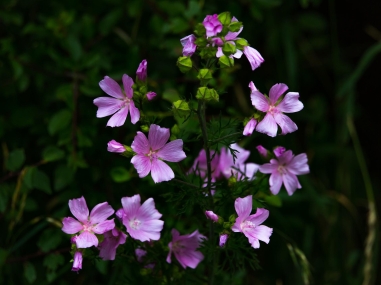How to recognize it ?
Mallow has the Latin name of Malva sylvestris. It is also called great mallow, wood mallow and wild mallow.

It is commonly found around homes, wastelands, roadsides and gardens. It blends beautifully with flowering meadows. Rich in pollen and nectar, its abundant flowering is highly appreciated by foraging insects.
How to grow and harvest it ?
- Mallow is a perennial plant that can become quite invasive in gardens. In winter, its leaves cover the ground. Before summer, it starts to emit stems that can sometimes reach more than 1 meter (3 inches) in height. Flowering takes place from June to September, preferably in sunny areas.

- The leaves are round with teeth while the flowers have 5 of mauve color with darker veins. The fruits are round and flat.
- It has a strong taproot.
- Emergence : between 2 and 4 weeks.
- Distance between plants : 1 meter (3 inches)
- Care : can be pruned at the end of winter.
- Soil : all types, drained, light.
- Mulching : straw, clippings.
- Water requirements : medium, watering during summer.
- Possible culture in pot : yes.
- Particularity : perennial, it reseeds itself very well.
Medicinal virtues
- Mallow is a soothing and emollient plant which, thanks to its mucilage, relieves and protects irritated tissues from the throat to the intestines.
- Its innocuousness and its great softness make it a plant particularly recommended to the babies, the young children and the pregnant women. It is, with the marshmallow, the plant of drainage of the intestines. It thus occupies a place of choice in the realization of a compound infusion. It allows to maintain the good functioning and the quality of the intestinal mucous membrane.
- It is mainly used as soft laxative by effect of ballast, which one can use on the long term contrary to certain more powerful and irritating plants like the senna or the bourdaine.
- It is anti-inflammatory, indicated in particular in the respiratory affections like the irritated throat, the angina and the bronchitis. It can also be used in eye and skin inflammations.
- The mallow prevents urinary affections by preventing the fixing of the bacteria on the walls of the bladder.
Updated on 13 December 2022 at 16:29







